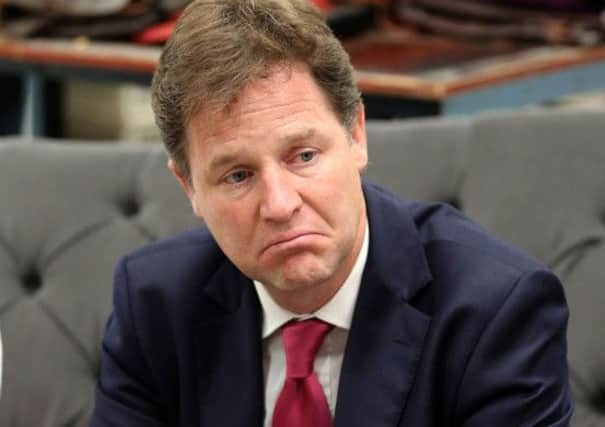£10m to help young people find work as jobless rate falls again


Deputy Prime Minister Nick Clegg will this morning announce the two cities are to receive £4.6m and £5m respectively for innovative projects to help young people back into work.
The grants are part of a £50m fund for England’s largest city councils, announced earlier this year and set aside specifically for youth unemployment hotspots.
Advertisement
Hide AdAdvertisement
Hide AdSheffield will use its money to offer advisors and mentors for young people struggling to find work, while Leeds is to run a pilot scheme using employment agencies and targeting the long-term unemployed.
Mr Clegg, the MP for Sheffield Hallam, said the funding was part of a wider programme of handing extra powers and funding to local areas through initiatives such as last year’s City Deals.
“I’m a big believer that organisations, businesses, local authorities are much better-placed locally to work out what works best to help get young people into work,” Mr Clegg told the Yorkshire Post.
“It increases employer engagement, which is essential, and it increase the flexibility to tailor what we’re doing for young people to suit the specific circumstances of the local labour market.”
Advertisement
Hide AdAdvertisement
Hide AdYesterday’s monthly jobs figures showed unemployment has continued to fall across the country as a whole, while the number of people in work has reached an all-time high. However, a record number of people are working part-time because they cannot find full-time jobs.
And Yorkshire bucked the national trend, with an extra 4,000 people out of work in the past three months – leaving the region’s unemployment rate at 8.9 per cent, well above the UK average.
The Government said that overall there were “very positive signs” on the jobs front, although unions voiced concern about the “unacceptable” level of youth unemployment, as well as the rate of so-called under-employment.
The employment total of just under 30 million is the highest since records began in 1971, after a huge increase of 177,000 between the three months to June and the quarter to September.
Advertisement
Hide AdAdvertisement
Hide AdThe jobless total fell by 48,000 to 2.47 million, the lowest since the spring of 2011, while the number of people claiming jobseeker’s allowance was cut for the 12th month in a row in October, down by 41,700 to 1.31 million, the lowest for almost five years.
Employment Minister Esther McVey said: “This Government is delivering on its promise to rebalance the economy, promote job creation and support people to get off benefits and into work.
“The number of people in work has risen by more than a million under this Government – driven by full-time private sector jobs.
“At the same time, the number of people claiming the main out-of-work benefits has fallen by almost half a million. There’s more work to do, and we are not complacent, but these are all very positive signs.”
Advertisement
Hide AdAdvertisement
Hide AdBut other data from the Office for National Statistics showed that 1.46 million people were working part-time because they could not find a full-time job, an increase of 24,000 over the quarter, and the highest figure since records began in 1992.
Almost a third of working men are in part-time employment because they cannot find a full-time job, compared with 13 per cent of women.
Shadow Work and Pensions Secretary Rachel Reeves, the MP for Leeds West, said: “The employment figures give no cause for complacency. The number of people who want to work full-time but are stuck on part-time hours is at a record high. And youth unemployment is still at unacceptable and unaffordable levels.”